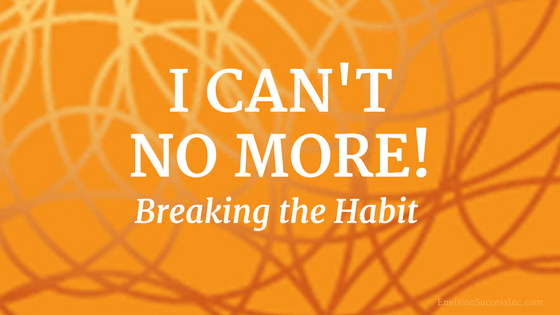
I was with family in Jackson Hole, WY for a recent family reunion. It was a lot of fun being in nature, hiking and riding the gondola to dizzying altitudes, rafting a river, and catching up with cherished family members.
Perhaps because I was in a more reflective mood in this natural environment and out of my normal routine, I noticed something surprising. My young nieces and nephews have fallen into the “I can’t” habit, sometimes accompanied by tears and always a frustrated cry for help. What really struck me was how quickly and how often the call of “I can’t” was raised, i.e., the poor sobbing 6 year-old who said “Dad, I can’t find my pants!” despite there being a limited supply of clothing in his one small bag.
Now, don’t misunderstand me; I certainly feel for the kiddos who are tired and out-of-sorts, and being so young they often do need help to navigate things out of their normal routines and comfort zone.
Compare this with the situation a client brought up a few weeks prior: an employee who has fallen into the trap of “I can’t” at work. Leaders want employees to come to them with solution-oriented conversation. They don’t want to hear venting (whining!) followed by a statement containing “I can’t.”
In fact, no one wants to hear “I can’t.” Ever.
Why then is it so ubiquitous?
It is a habit, and especially when it’s heard from others, it is easily picked up and used when frustration hits. Similar to the baffling overuse of “like” in almost every scenario imaginable…but that’s another topic (rant) for another day.
Since you’ve read this far, I can bet you’re running through your past few conversations and wondering how many times “I can’t” was used…or a similar variation indicating the act of giving up.
How disturbing this is!!
How to break someone of the habit of saying "I can't"
Let’s do something about it together. Every time “can’t” pops up in conversation, see if inserting the word “yet” or “can” changes things for the better.
For example, when my very smart, perfectly capable nephew whined that he couldn’t figure out the assignment in his workbook a la “I can’t _____,” I calmly responded. “You mean you didn’t figure it out YET.” We then sat down to focus on the assignment’s possibilities.
When my client’s employee bounded into his office frustrated with another coworker, process, situation, etc…indicating the dreaded c had taken over, he was poised to respond with “What CAN you do to make it better?”
You likely remember your mom or teacher correcting you frequently until you learned to say “Please” or to swap “I’m finished” for “I’m done,” or as in my chiropractor’s family — to change from “I’m sick today” to “I’m grateful to be healthy.”
This is just as easy to shift over time with some consistency. Pretty soon, you’ll notice they’ve not only changed their words, but their MINDSET. By helping them learn to break the habit and approach things differently, you are also helping them grow and evolve (and saving yourself time and frustration.)
Now: what CAN you do today to help someone break the “I can’t” habit?
hugs, Heather
Can you relate? Share this post to connect others to these insights:
